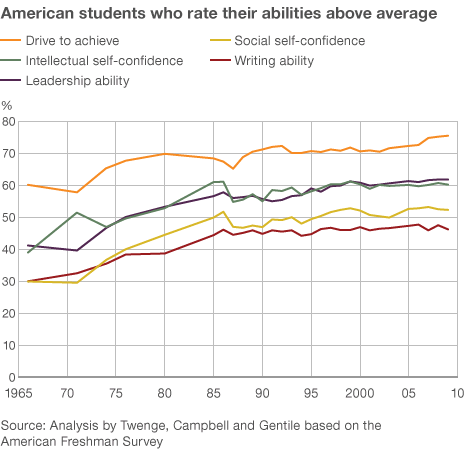With the nationwide student debt toppling out of control, the question on many people’s minds seems to be “Is college worth it?” The problem, it appears, is that college-bound students don’t seem to be asking themselves this ever pressing question. Earlier this year, UCLA released a study that shows that American college freshmen consider themselves “above average” in many key areas. This could be causing more students to take out larger loans when deciding on which college to attend, only adding further to the nation’s massive student loan debt.
Over 9 million students have taken the American Freshmen Survey over the past 47 years, and the data stretches back to 1966. The survey asks college freshmen to compare themselves to their peers. Since the 1960s, there have been dramatically more students who rate themselves as above average in the areas of academic ability, drive to achieve, mathematical ability, and self-confidence.
The trend has been labeled “Ambition Inflation.” The analysis was done by psychologist Jean Twenge and her peers. Many articles have gone on to cite Twenge’s research in projecting that this ambition inflation might be leading to the post-college depression of the Prozac Age. Students’ expectations are not based in the reality of our current economic climate.

What about before graduating from college? This is a survey of current college freshmen each year, isn’t it?
The survey analysis might give us a better idea of why student debt has topped $1 billion. Adults who are aware of the ever-increasing debt and many critics of higher education are asking themselves whether or not college is actually worth it. The current freshmen may be aware of these issues, but the majority seems to think they are the exception to the rule.
Think about it: If over 60 percent of college freshmen think their ambition exceeds that of their peers, they probably think that they will get a great job out of college and will be able to take on extra student debt. The ambition inflation is probably keeping more students from starting at a community college for their first two years or picking the lesser-renowned institution that offered a lot of financial aid over the more expensive, more prestigious option.
The hard truth might be that expectations need to find a happy medium with reality. Students need to be fiscally responsible and realistic in their decisions. You can pursue your dreams by making good choices and actually working hard, not just saying you’re working hard. Maybe this younger generation needs to be taught that if you are indeed above average, you don’t need to go into massive student loan debt to prove it. A quality education is what you make of it and the work you put in.
Last week, we wrote about the many complications of financial aid offers from colleges. After parents and potential students analyze the financial aid offers, the next step is to make a decision. Kids and parents need to keep "ambition inflation" in check and make smarter choices. The best way to stop the ever-growing student loan debt problem is at the source.
